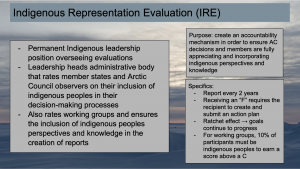Overview:
All of our cases studies have touched or focused on the disproportionate impact that warming is having on the high north. This is causing issues for many different species in the high north that indigenous people rely on, not only for subsistence but also for cultural well-being and the identity of a community. The first step in addressing all of these issues is supporting Arctic indigenous communities and lifting up their voices in other arenas.
Want to keep up with policy developments?:
Want to keep up with caribou? The Council for Arctic Flora and Fauna is a great place to look — https://arctic-council.org/en/about/working-groups/caff/
Want to keep up with sealing and hopefully the recovery of seal products? The Library of Parliament – Canada’s Seal Harvest is a great place to look — https://lop.parl.ca/sites/PublicWebsite/default/en_CA/ResearchPublications/201718E
Want to keep up with aboriginal subsistence whaling? The International Commission on Whaling is a great place to look — https://iwc.int/aboriginal
Want to keep up with the inclusion of indigenous knowledge in western science? The Nunavik Research Centre always has amazing projects on hand! — https://www.makivik.org/nunavik-research-centre/
Overarching Policy Recommendations:
We must allocate funding and training for the education of indigenous community members. This can include hunting technics and the use of new tools, to engagement with community based monitoring projects. This will also allow for expansion of on-the-ground organizations like the National Park Service to improving these partnerships will improve knowledge acquisition and research efforts.
Finally, we think action within the Arctic Council should be taken to ensure indigenous voices are heard: Indigenous Representation Evaluations have the potential to create and protect sustained indigenous involvement within the Arctic Council.

This proposal calls for the creation of a new body within the A.C. This new body will be indigenous led and will assess Arctic Council working groups, research/development projects, and states on their involvement of indigenous knowledge and leadership. The body will generate bi-annual reports on the activities of Arctic Council Members; evaluations will consider participation quotas and indigenous leadership and will give projects a rating as well as suggestions to augment indigenous participation. Working groups, states, research institutions, and industry projects in the Arctic will be asked to submit an action plan to the I.R.E. body if they receive a low grade or fail to improve between reports. This proposal will create permanent public accountability system for indigenous participation in the Arctic .
How can you make a difference?!
Get involved on social media and raise awareness about these issues!
- Awareness around these issues means that policy makers are more willing to allocated funds and set up joint research projects.
- Awareness might destigmatize aboriginal sealing.
- Awareness might drive more people to action about their impact on the environment when seen more directly through the lens of the people being impacted.
